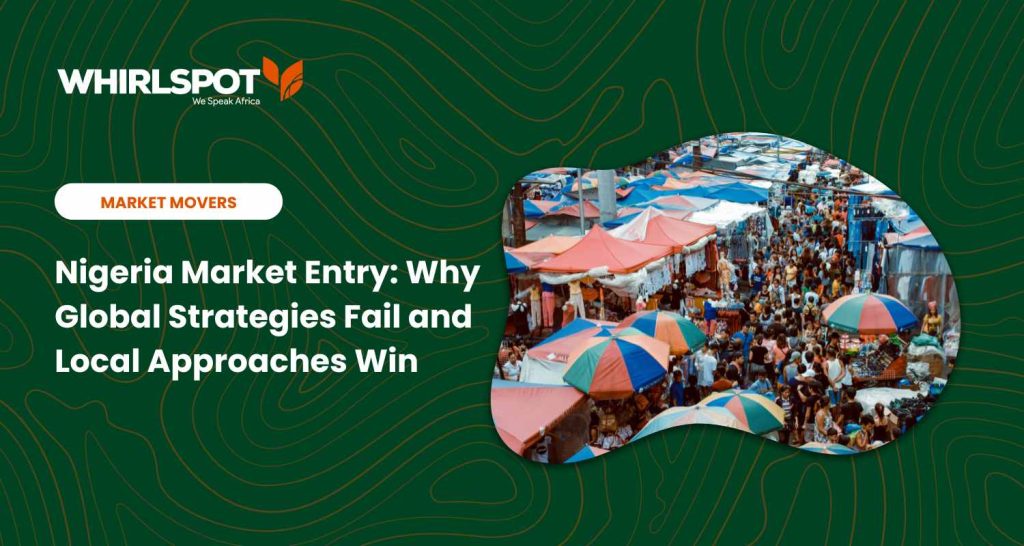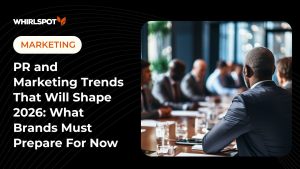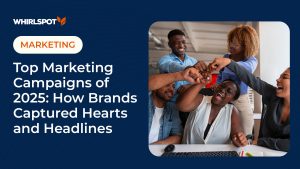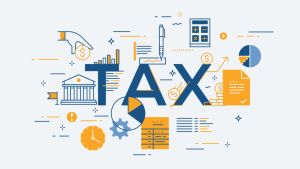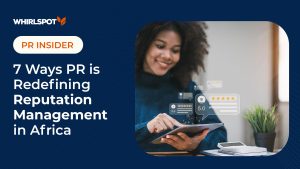You’ve mastered London. You’ve scaled Dubai. You’ve cracked Toronto. But you see the Nigeria market entry? We can confidently tell you it’s a whole different energy, and one that doesn’t play by the usual rules. With 237+ million consumers who don’t respond to lazy playbooks, this market rewards boldness, and not copy-paste strategies.
The Undeniable Truth
Your brand’s impressive track record in London, Dubai, and Toronto speaks volumes. As you consider Nigeria, it’s important to recognize that this market, with its 237+ million diverse consumers, operates on unique principles and requires a distinctive approach. Successfully engaging Nigerians, or replicating your global success here, will depend on adapting your approach to their distinct ways of thinking, shopping, and building trust, rather than assuming the conventional global models will directly apply.
The reality is that many International brands struggle to gain traction in Nigeria, with a significant number often exiting the market within 18 months.
But the most successful brands have discovered a simple code: Nigeria rewards brands that adapt to its market realities, rather than imposing external strategies.
This guide walks you through exactly how to do that in 2025, from understanding the market forces reshaping Nigeria right now, to building trust in a relationship-first economy, and then to launching smart without bleeding cash.
By the end, you’ll know whether Nigeria is worth your next big bet. And if it is, you’ll have a roadmap that actually works.
Why Nigeria Should Be on Your Radar (The 2025 Reality)
Nigeria isn’t just another African market where you can copy-paste your strategy. It’s 237+ million people (2025 figures) in a market that’s fundamentally different from what most business plans assume.
Here’s what makes 2025 the right time to enter:
The Trends Reshaping Everything
Gen Z Controls ₦10 Trillion in Spending: With over 40% of Nigerians being Gen Z, a digitally-savvy demographic that’s already shaping purchasing trends. They represent a powerful, immediate consumer base that isn’t waiting to spend, they’re doing it now.
The Mobile Money Revolution is Complete: 89% of Nigerians use smartphones for financial transactions. Mobile payment systems processed over ₦38 trillion in 2024. This isn’t an emerging trend but a fully established infrastructure in the country.
This means consumers can now easily and reliably complete online purchases, a stark contrast to the challenges faced just five to seven years ago.
AI-Powered Marketing is Taking Off: 60% of Nigerian marketers will use AI tools by 2025. Think WhatsApp chatbots that speak Pidgin or hyper-targeted ads for Lagos shoppers. If you’re not thinking about this, you’re already behind.
Sustainability Actually Matters Now: 55% of consumers prefer sustainable brands, and this number is growing fast among younger Nigerians.
This demographic is willing to pay a premium for eco-friendly products and brands using local materials like Nigerian cotton.
The Fintech Boom Changed Everything: Apps like Opay and Palmpay are making “Buy Now, Pay Later” mainstream. By 2025, 30% of online purchases will use installment plans. This fundamentally changes how you should think about pricing and customer acquisition.
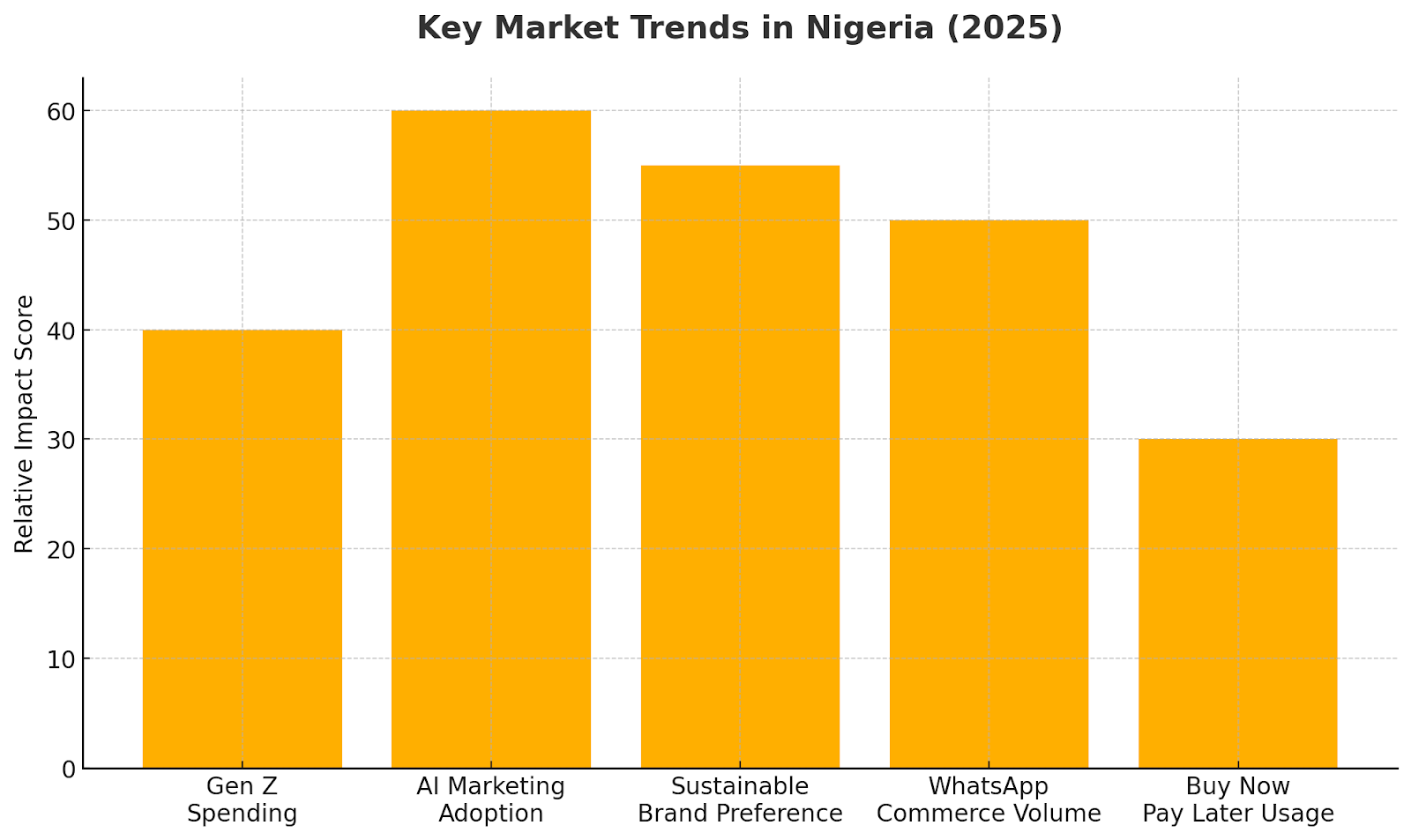
The Market Structure You Need to Understand
Lagos moves at Silicon Valley speed. Kano operates on relationship time. Port Harcourt thinks in oil cycles. Abuja runs on government rhythms.

The ‘Three Nigerias’ You Need to Know:
- Urban Core (Lagos, Abuja, Port Harcourt)
These are your early adopters. They lead in internet and smartphone use (Nigeria’s broadband penetration hit 45.61% in January 2025 and rose to 48.15% by April 2025, with cities like Lagos and Abuja way above that). Lagos alone ranked 76th globally in the 2025 Global Startup Index (dropped from 70th in 2024) and is Africa’s fintech hotspot alongside growing innovation hubs in Abuja and Port Harcourt. That means fast movers, digital-minded consumers, but expect steep competition and high acquisition costs. Broadband subscriptions reached 101.8 million by March 2025, though Nigeria still targets 70% penetration by 2025 from the current levels. - Emerging Cities (Ibadan, Kano, Owerri): Massive populations with growing middle classes. More price-sensitive, but but incredibly loyal once you win them. Still prefer physical touchpoints over pure digital plays. Ibadan is the third-largest city by population in Nigeria after Lagos and Kano, with a total population of 3,649,000 as of 2021, and over 6 million people within its metropolitan area. Kano on the other hand, is situated in the northern part of Nigeria and is the second-most populated city in the country, with a population of around 3.5 million
- The Rest: 60% of the population. Mobile-first but cash-heavy. Word-of-mouth drives everything. Don’t ignore them, but don’t start here unless you have unlimited patience and capital.
Many brands mistakenly view Lagos as representative of all of Nigeria. While Lagos is home to 15 million people with distinct spending power and habits, the broader nation comprises over 237 million individuals living within radically diverse economic realities, spread across vastly different economic landscapes. Prioritize identifying your precise Nigerian market segments before planning broader expansion.
Know Your Customers (The Real Ones)
The Nigerian market demands a rethink of your typical traditional buyer personas. Here, customers are deeply embedded in WhatsApp groups, influenced by family members, colleagues, friends, and swayed by trusted neighbor recommendations far more than your million-dollar conventional ad campaign. Therefore, engaging them effectively requires presence in non-traditional spaces such as popular barbershops or salons, shared transportation hubs, hot spots, and even local university campuses where conversations and trust organically build.
The WhatsApp Shopper: Lives in Victoria Island or Lekki. Shops in WhatsApp Status, Groups, and Channels. They buy based on peer reviews and “aunty testimonials.” This group has money but won’t part with it until three friends confirm you’re legit. Values convenience over everything else.
The Gen Z Influencer: Controls part of that ₦10 trillion in spending power. Discovers products on TikTok, researches on Instagram, and expects brands to understand their language. They’re incredibly savvy—they’ll research your brand, check reviews, and ask their friends before buying.
The Community Influencer: Could be in Lagos or Kano. Buys first, influences others. Once you win them, they become your unpaid sales team. They care about status and being the first to discover something good. They’ll test your product thoroughly and share honest feedback, whether you want it or not.
The Practical Optimizer: Found everywhere. Studies every purchase. Compares prices across five different channels. Asks detailed questions about durability, warranty, and value. Takes forever to buy but becomes your most loyal customer once they do.
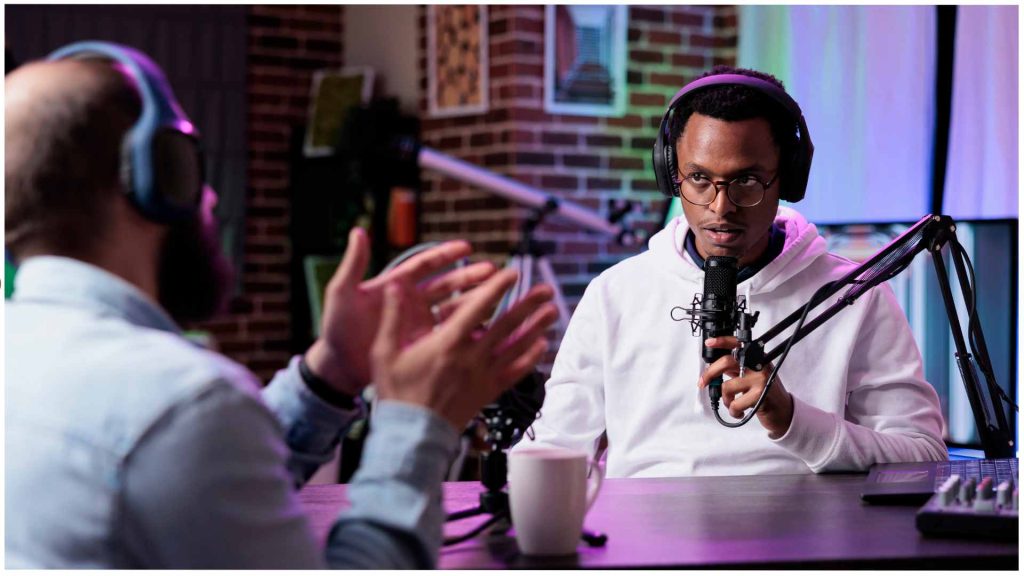
What Really Drives Purchase Decisions
Quality That Lasts: Nigerians are value-sensitive, not price-sensitive. SON estimates that 80% of imported goods are substandard. When your brand offers something that actually lasts, people will pay for it.
Local Relevance: Products must work in Nigeria’s climate and lifestyle. A European makeup brand had to reformulate their foundation for Lagos humidity, and it became their bestseller across West Africa.
Social Proof: 65% of Nigerian consumers rely on friends and family when making purchase decisions. 58% check online reviews. Meanwhile, word-of-mouth is still king.
Cultural Respect: Nigerians are incredibly proud of their country and culture. Show genuine understanding and respect, and people notice. Get it wrong, and they’ll roast you online.
Adapt Your Product or Don’t Bother
Nigeria will stress-test your product in ways your home market never did.
The Climate Reality Check: That leather product that lasted five years in London? It’ll crack in Lagos heat and humidity within six months. Your electronics need to handle power surges. Your cosmetics will separate in 35-degree heat,heat unless formulated for tropical storage.
The Usage Reality Check: Nigerians use products harder and expect them to last longer. A phone case isn’t just protection, it’s expected to survive two years of okada rides, market visits, and daily hustle.
*Okada = commercial motorcycle transport, often fast, bumpy, and unpredictable.
The Infrastructure Reality Check: Your app requiring constant high-speed internet won’t work for 70% of the market. Your product needing refrigeration is useless in areas with unreliable power.
Real Examples That Work:
- MTN became the largest telecom by adapting recharge systems to small, flexible amounts
- Indomie dominated by creating smaller pack sizes and local flavours
- PiggyVest grew by designing savings products around irregular income patterns
- Opay scaled fast by solving daily needs, starting with bike rides, then introducing payments with zero fees, as well as agent networks.
Earn Trust in a Proof-Driven Market
Trust in Nigeria isn’t built only through brand campaigns or celebrity endorsements. It’s built through proof, consistency, and community validation.
What Builds Trust:
Visible Founders: Nigerians want to see who’s behind the business. Put faces and stories to your brand. Show up at events. Be accessible on social media.
Customer Evidence: Screenshots of satisfied customers, video testimonials, before-and-after photos. The more specific and local, the better.
Community Integration: Sponsor local events. Support community causes. Show you’re invested in Nigeria, not just extracting from it.
Transparent Pricing: Hidden fees kill trust instantly. Lead with clear, all-inclusive pricing.
What Kills Trust:
Over-promising: If you say “same day delivery,” deliver same day. Nigerians have long memories for brands that didn’t keep their word.
Ignoring Complaints: Bad customer service spreads faster than good news. One unresolved complaint in a WhatsApp group can kill months of marketing effort.
Cultural Blindness: Getting basic Nigerian references wrong or showing ignorance about local customs makes you look like you don’t belong.
The 2025 Launch Playbook
Phase 1: Soft Entry (Months 1-3) – Test the Waters
Start with Lagos, But Plan for Nigeria
Lagos generates 30% of Nigeria’s GDP and sets trends. It’s a smart place to start, but it’s not a blueprint for the rest of the country. Strategies that work in Lekki might flop in Owerri.
For example, Glovo’s missed moment. The Spanish delivery brand entered Lagos with a solid global playbook, but they missed a local detail that mattered: Lagos doesn’t sleep. Demand for food spikes late at night, but Glovo shut down deliveries by 9 p.m.
Meanwhile, local competitor Chowdeck offered 24/7 delivery from day one. That small difference, aligning operations with how Lagos actually lives, led to word-of-mouth buzz and true traction, while Glovo’s brand awareness fizzled gradually.
The lesson: Even within Lagos, success hinges on nuance. And if you can misread Lagos, imagine what might happen in Kano or Owerri.
Social Media Benchmarks (Realistic Targets):
- Instagram: 4-5 posts per week, aim for 1,000+ likes per post
- TikTok: 3 videos weekly, 5,000+ views per video (varies wildly)
- Use AI tools for Pidgin ads—this is the 2025 tech trend advantage
Influencer Strategy: Micro-influencers (10K-100K followers) often give better ROI:
- Higher engagement rates (6-8% vs 2-3% for macro-influencers)
- More authentic connections
- Costs ₦50,000 to ₦200,000 per post
Distribution Testing: Test Jumia, Konga, and WhatsApp Commerce. WhatsApp is processing ₦5 billion monthly through group chats—it’s not a side channel, it’s mainstream.
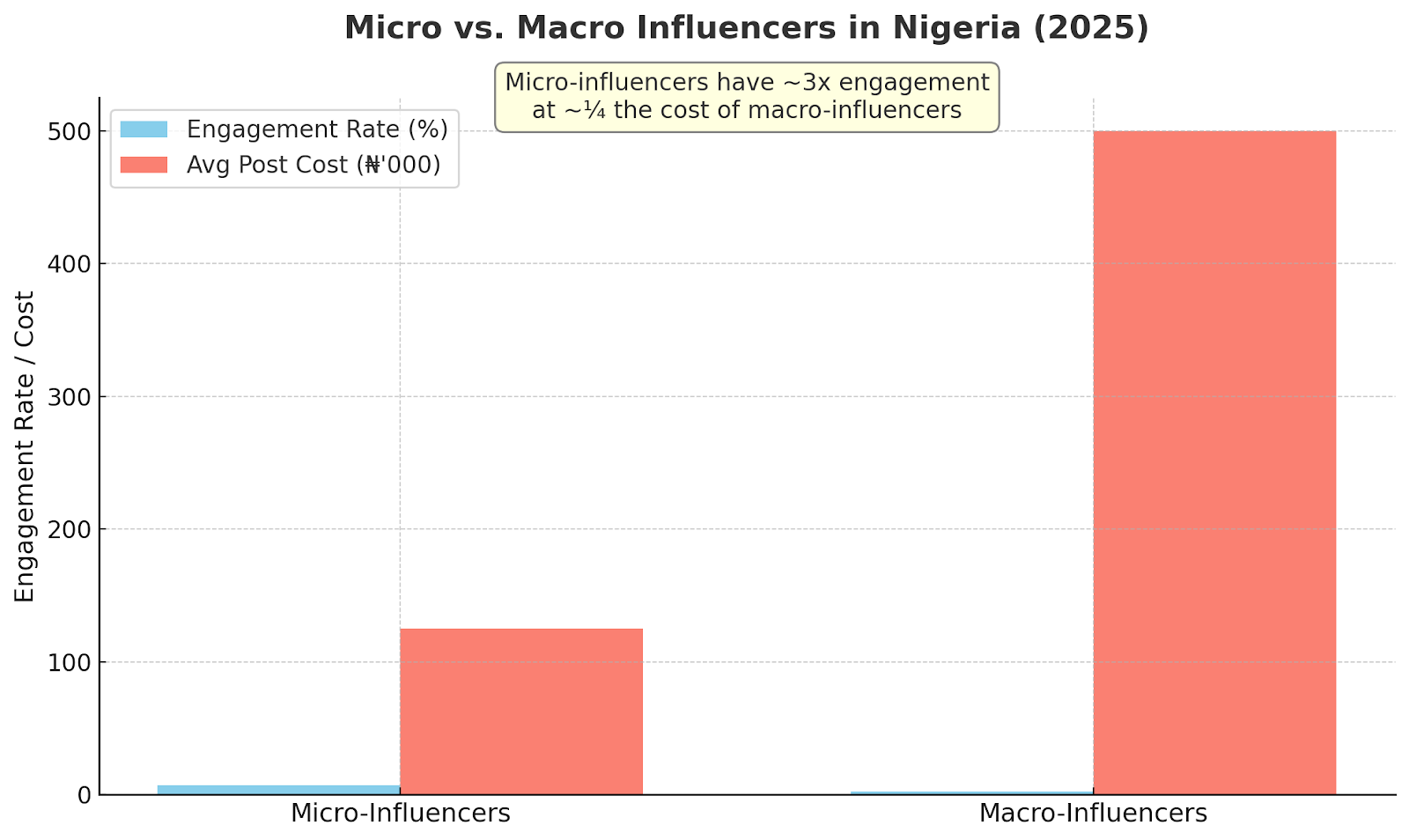
Phase 2: Media Blitz
(Month 4) – Build Credibility
Press Strategy Targets:
- 15-20 media mentions in your first major push
- 3-5 mentions in tier-1 publications (Punch, Vanguard, ThisDay)
- Focus on stories about solving local problems or sustainability
Phase 3: Event Marketing
(Month 5) – Create Buzz
Launch Event Strategy:
- Time for festive seasons when people are in celebratory mood
- Let people touch, try, and experience your product
- Use local vibes: Nigerian music, local influencers, eco-friendly materials
Get Your Payment and Pricing Strategy Right
Payment Reality (2025 Update)
Here’s what payment preferences actually look like:
- Cash: Still king for transactions under ₦20,000
- Bank Transfers: Popular for larger purchases
- Mobile Money: Growing fast, especially online
- Buy Now, Pay Later: 30% of online purchases by 2025
- Credit Cards: Less common than expected
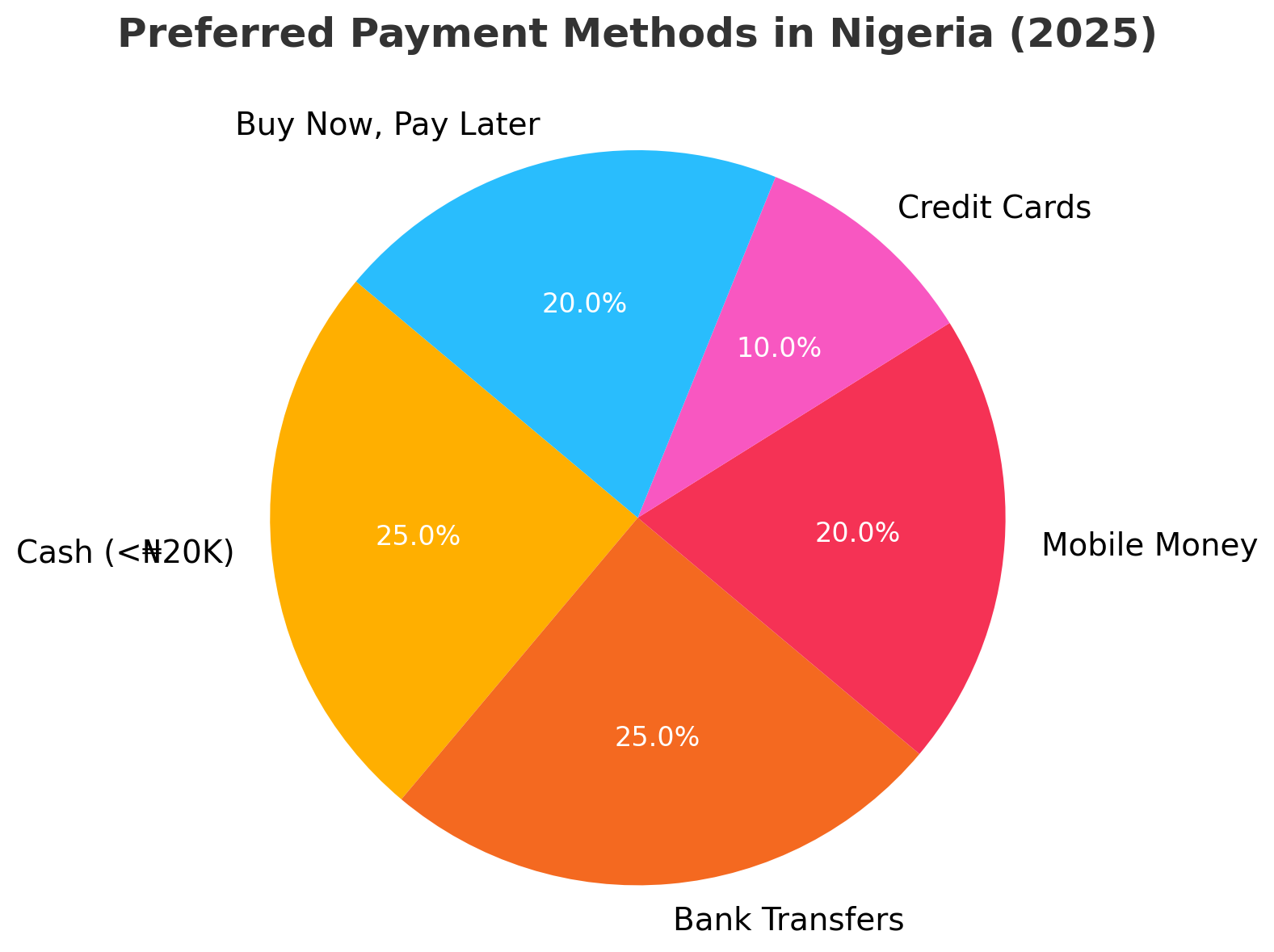
The Premium Pricing Experiment
A beauty brand priced 20% above local competitors wasn’t selling. They raised prices by 40%, sales picked up and reviews improved. Sometimes price sends a quality signal, especially for unfamiliar brands.
Value Communication That Works
Don’t just say your product costs ₦50,000. Frame it:
- “This lasts 5 years – less than ₦30 per day for reliable performance”
- “Saves you ₦25,000 annually in electricity costs”
- “Buy one that lasts five years vs. three cheap alternatives”
Legal and Regulatory Requirements
Essential Registrations
Corporate Affairs Commission (CAC): Get this done properly. It gives you credibility and legal protection. Don’t try to cut corners here.
NAFDAC: If your product is consumable, cosmetic, or health-related, you need this. The process can take months, so start early. I cannot stress this enough.
SON Certification: Required for many products. Again, start this process early. I’ve seen launches delayed by 6+ months because companies didn’t plan for this.
Tax Reality
- VAT: 7.5% on most goods and services.
- Import Duties: These can be substantial. Consider local assembly or production if it makes sense for your product.
- Corporate Income Tax: Factor this into your pricing from the beginning.
The tax system can be complex, and enforcement is becoming more strict. Get good local tax advice. Don’t try to figure this out yourself.
Crisis Management
Things will go wrong. That’s not being negative or pessimistic, it’s just how things work in the real world. Every brand hits unexpected bumps. The difference is in how you respond.
Speed Matters
In Nigeria, news travels fast on social media. If there’s a problem with your product or service, you need to respond quickly. “We’re looking into it” is better than silence. Trust me on this.
Take Responsibility
Nigerians appreciate companies that take responsibility for their mistakes. Don’t blame others or make excuses. Acknowledge the problem and explain what you’re doing to fix it. This approach has saved several launches I’ve worked on.
Over-Communicate
Keep customers informed throughout the resolution process. Even if you don’t have updates, let people know you’re still working on the concern. Silence is deadly in crisis situations.
Common Mistakes to Avoid
The “Lagos = Nigeria” Mistake
Lagos is vibrant, influential, and often sets the trends but it’s not the blueprint for the entire country. Strategies that thrive in Lagos can easily fall flat elsewhere.
Take the example of a fashion brand that did extremely well in Lagos. Once they tried expanding, they hit a wall. Their marketing leaned heavily on nightlife and social scenes, usually perfect for Lekki and Victoria Island, but completely misaligned with more conservative cities like Kano or even parts of Abuja.
Nigeria is diverse. Culture shifts city to city. Messaging that resonates in one region might feel completely off in another. That’s a mistake too many brands still make.
Ignoring Traditional Retail
E-commerce gets all the attention, but traditional retail is still huge in Nigeria. Many consumers prefer to see and touch products before buying, especially expensive items. If you’re only focusing on online sales, you’re missing a massive opportunity.
Underestimating Local Competition
Nigerian entrepreneurs are incredibly creative and resourceful. Don’t assume you’ll dominate just because you’re foreign. Local competitors often provide better customer service because they understand Nigerian customer expectations better than you do.
I’ve seen foreign brands lose market share to local competitors who offered inferior products but superior customer service. Don’t let this be you.
Cultural Missteps
These can destroy your brand before it gets started. I remember a fast-food brand that ran an ad campaign during Ramadan that was seen as insensitive to Muslim customers. The backlash was swift and severe. They never recovered.
Measuring Success Beyond Sales
Metrics That Actually Matter
- Brand Awareness: Social media mentions, search volume, unprompted recall
- Customer Satisfaction: Happy customers become your best marketing channel
- Repeat Purchase Rate: Multiple purchases indicate you’re doing something right
- Regional Performance: Success patterns vary significantly by region
Long-term Indicators
- Organic growth through recommendations
- Local partnerships wanting to work with you
- Positive media coverage without paying for it
- Qualified Nigerians wanting to work for you
What I’d Do Differently Next Time
After watching how different launches play out in this market, a few things stand out. Same mistakes, same blind spots. If there’s a next time, here’s what should change:
Start Smaller: Don’t try to launch nationwide immediately. Pick one city, get it right, then expand. I’ve seen too many brands spread themselves too thin.
Invest More in Local Relationships: The brands that succeed long-term in Nigeria are the ones that build genuine relationships with local partners, customers, and stakeholders. This takes time, but it’s worth it.
Be More Patient: Nigerian market development takes time. Don’t expect immediate results, and don’t panic if growth is slower than projected. The brands that stick around are the ones that play the long game. Plan for years, not months.
Listen More: Nigerian consumers will tell you what they want if you ask them and actually listen to the answers. Too many brands assume they know what customers want without asking.
Your Next Steps
If you’re serious about launching in Nigeria:
- Visit Nigeria: You can’t understand this market from afar
- Start Building Relationships: Connect with potential partners before you need them
- Test Your Assumptions: Whatever you think you know, test it with real customers
- Plan for the Long Term: Nigeria rewards long-term thinking
Final Thoughts
Nigeria’s 237+ million people, young demographics, and growing digital economy make it irresistible. The 2025 trends from Gen Z’s spending power to the fintech boom create unprecedented opportunities.
But success requires more than recognizing the opportunity. It requires understanding that Nigeria isn’t just another market to conquer. It’s a community to join.
Don’t see Nigeria as a revenue opportunity. See it as a relationship opportunity. Build trust, deliver value, respect the culture, and Nigeria will reward you with loyalty and growth that can last for generations.
The brands that succeed in Nigeria are the ones that Nigerians believe in. Make your brand worthy of that belief.
Every successful brand in Nigeria started with someone taking that first step. The question is: are you ready to take yours?
WhirlSpot Media: Nigeria Market Entry Done Right
Nigeria has 237 million people and ₦10 trillion in Gen Z spending power. So why do most international brands exit within 18 months?
Simple. They bring Global strategies to Lagos markets.
WhirlSpot Media helps you avoid that mistake.
We Know What Works (And What Doesn’t)
While other agencies pitch global strategies, we build Nigeria-specific playbooks. We know Lagos moves at Silicon Valley speed, Kano operates on relationship time, and that WhatsApp drives ₦5 billion in monthly sales.
We’ve seen brands crash because they missed local nuances. We’ve also seen them win big when they got it right.
What We Deliver
Market Intelligence: Real data on Nigeria’s three distinct markets—Urban Core, Emerging Cities, and The Rest. We map your actual customers, not assumptions.
Trust-Building Campaigns: PR that gets you into Punch and Vanguard. Influencer partnerships that convert. Community events that build lasting relationships.
Digital Strategy That Works: SEO for Nigerian search behaviour. Sles.
Launch Execution: From NAFDAC approvals to payment integration. We handle the details that make or break Nigerian market entry.
Why Choose WhirlSpot
We’re Nigeria-based. We live in the market daily. WhirlSpot empowers you not only to enter, but also to win in the African market. We provide the tools and expertise to track media coverage, uncover deep insights, and demonstrate the real impact of your PR and marketing efforts. From gaining visibility across Africa to securing vital partnerships, we ensure your brand doesn’t just speak, it resonates and shines.
Your competitors are still guessing. We know.
Ready to enter Nigeria’s market the right way? Let’s build your success story.
Contact WhirlSpot Media at hello@whirlspotmedia.com
